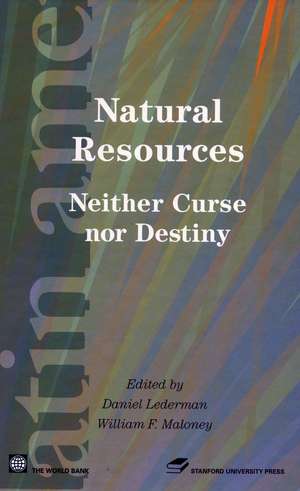Natural Resources: Neither Curse Nor Destiny: Latin American Development Forum
Editat de Daniel Lederman, William Maloneyen Limba Engleză Paperback – 26 oct 2006
For almost as long as economics has been a profession, the role of natural resources in the promotion of economic growth has been among the core issues of development theory. Some newer theories suggest that natural riches produce institutional weaknesses as various social groups attempt to capture the economic rents derived from the exploitation of natural resources. Since the 1960s, some analysts have argued that resource-rich developing countries have grown more slowly than other developing countries. Nevertheless, we find ourselves in a time when conventional wisdom again postulates that natural resources are indeed riches.
This book brings together a variety of analytical perspectives, ranging from econometric analyses of economic growth to historical studies of successful development experiences in countries with abundant natural resources. The evidence suggests that natural resources are neither a curse nor destiny. Natural resources can actually spur economic development when combined with the accumulation of knowledge for economic innovation. Furthermore, natural resource abundance need not be the only determinant of the structure of trade in developing countries. In fact, the accumulation of knowledge, infrastructure, and the quality of governance all seem to determine not only what countries produce and export, but how firms and workers produce any good.
This book brings together a variety of analytical perspectives, ranging from econometric analyses of economic growth to historical studies of successful development experiences in countries with abundant natural resources. The evidence suggests that natural resources are neither a curse nor destiny. Natural resources can actually spur economic development when combined with the accumulation of knowledge for economic innovation. Furthermore, natural resource abundance need not be the only determinant of the structure of trade in developing countries. In fact, the accumulation of knowledge, infrastructure, and the quality of governance all seem to determine not only what countries produce and export, but how firms and workers produce any good.
| Toate formatele și edițiile | Preț | Express |
|---|---|---|
| Paperback (1) | 356.11 lei 22-36 zile | |
| Stanford University Press – 26 oct 2006 | 356.11 lei 22-36 zile | |
| Hardback (1) | 1212.41 lei 43-57 zile | |
| Stanford University Press – 29 oct 2006 | 1212.41 lei 43-57 zile |
Din seria Latin American Development Forum
-
 Preț: 219.80 lei
Preț: 219.80 lei -
 Preț: 221.70 lei
Preț: 221.70 lei -
 Preț: 286.49 lei
Preț: 286.49 lei -
 Preț: 361.39 lei
Preț: 361.39 lei -
 Preț: 392.42 lei
Preț: 392.42 lei -
 Preț: 253.01 lei
Preț: 253.01 lei -
 Preț: 375.92 lei
Preț: 375.92 lei -
 Preț: 385.38 lei
Preț: 385.38 lei -
 Preț: 298.14 lei
Preț: 298.14 lei -
 Preț: 374.14 lei
Preț: 374.14 lei -
 Preț: 439.34 lei
Preț: 439.34 lei -
 Preț: 221.11 lei
Preț: 221.11 lei -
 Preț: 219.20 lei
Preț: 219.20 lei -
 Preț: 233.79 lei
Preț: 233.79 lei -
 Preț: 319.21 lei
Preț: 319.21 lei -
 Preț: 320.74 lei
Preț: 320.74 lei -
 Preț: 233.50 lei
Preț: 233.50 lei -
 Preț: 323.47 lei
Preț: 323.47 lei -
 Preț: 313.89 lei
Preț: 313.89 lei
Preț: 356.11 lei
Nou
Puncte Express: 534
Preț estimativ în valută:
68.14€ • 71.33$ • 56.72£
68.14€ • 71.33$ • 56.72£
Carte disponibilă
Livrare economică 10-24 martie
Preluare comenzi: 021 569.72.76
Specificații
ISBN-13: 9780804757096
ISBN-10: 0804757097
Pagini: 392
Dimensiuni: 152 x 229 x 23 mm
Greutate: 0.54 kg
Ediția:1
Editura: Stanford University Press
Colecția Stanford Economics and Finance
Seria Latin American Development Forum
ISBN-10: 0804757097
Pagini: 392
Dimensiuni: 152 x 229 x 23 mm
Greutate: 0.54 kg
Ediția:1
Editura: Stanford University Press
Colecția Stanford Economics and Finance
Seria Latin American Development Forum
Notă biografică
Daniel Lederman is a Senior Economist in the Office of the Chief Economist for Latin America and the Caribbean at the World Bank. William F. Maloney is Lead Economist in the World Bank's Office of the Chief Economist (LCRCE) of the Latin America and Caribbean region.
Descriere
This book brings together a variety of analytical perspectives, ranging from econometric analyses of economic growth to historical studies of successful development experiences in countries with abundant natural resources. The evidence suggests that natural resources are neither a curse nor destiny.
